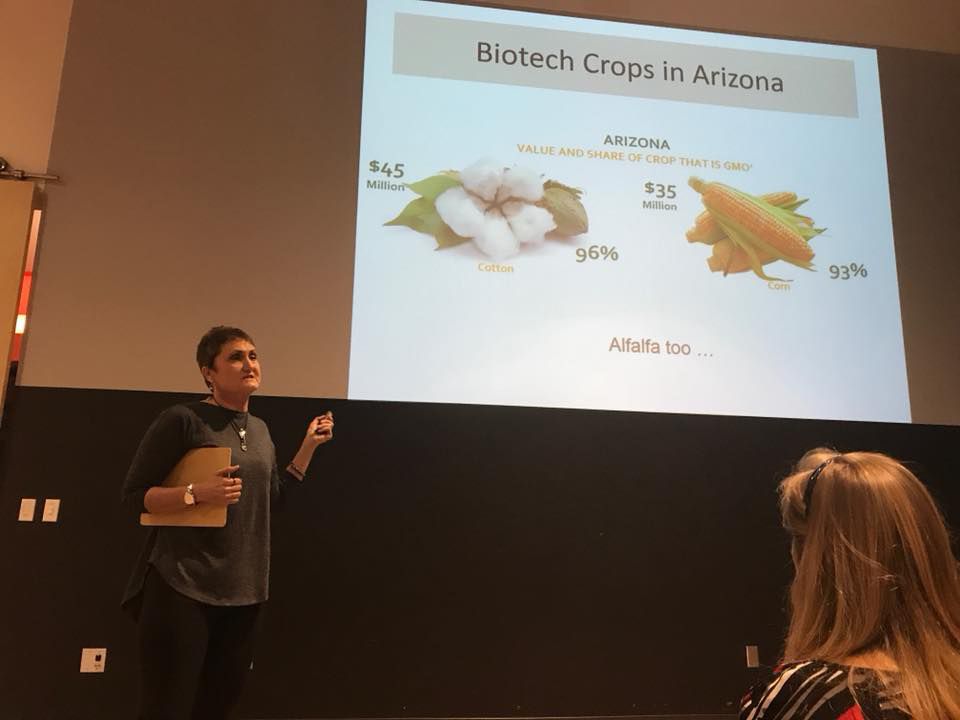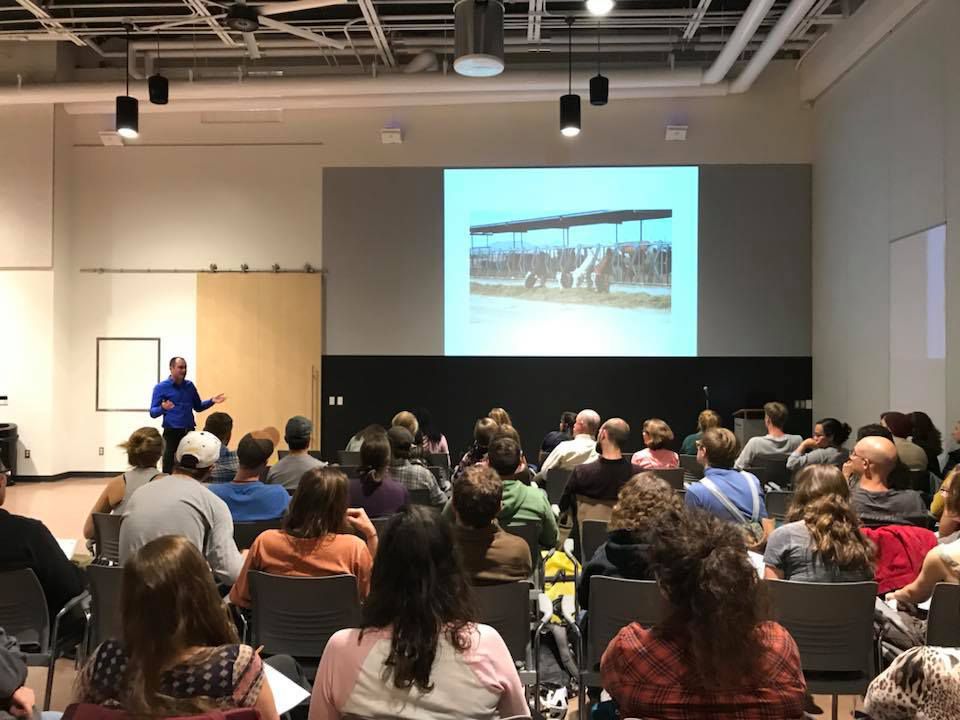How to Win the GMO Debate on a College Campus
Author
Published
11/1/2017
Even if you might be shaking in your boots or experience being shouted off stage, there’s one debate worth wading into: the GMO debate. Why, because the fear is unfounded.
Not the fear of being shouted off stage on a college campus, but the fearmongers trying to convince you that GMOs are unhealthy for you. Too much sugar, overeating and lack of variety in our American diets are the things to fear; not modified foods.

The GMO debate is worth wading into because it's an opportunity to speak the truth about a technology that's saving the environment, improving agriculture and ultimately will improve health (think Golden rice). Here, I stand before a bright group of NAU students.
Arizona Dairy Farmer Wes Kerr and myself landed on Northern Arizona University’s campus last week to be part of a debate with a GMO Free-Arizona representative. And though there wasn’t an audience vote, I think Wes and I, the pro-GMO debaters, won the night. Here’s why.
1. Speak the truth : We shared the science and highlighted that 20+plus years of research has gone into studying GMOs, specifically transgenic modification of plants and the only highly-regulated class of plant modification.

Arizona Dairy Farmer Wes Kerr has spent his young life learning more and more about genetics. He has a facinating story to tell and the NAU audience was all years.
2. Show empathy : But, today because we are not a science-based society, science without empathy won’t get you anywhere in a debate. I started out highlighting that we all have every right to question and investigate the science. That’s core to what makes science so special, we study a hypothesis. Plus, show that you care. I always tell my audience why I’m up there and telling the GMO story, it’s because I care. Wes did the same thing, he showed he cared.
3. Tell personal stories : And, in showing that you care, tell your own story. I told about our family’s own use of biotech/GMO crops, specifically cotton and how it reduced our pesticide use well over 90%. Wes told about his family’s dairy farm and how at an early age he became fascinated with genetics because of their dairy cows.
I explained to the audience how our family was always looking for improvements on the farm. From the tractor at right in the 1960s helping mom and dad farm, to the first year we planted biotech cotton in 1996, we were constantly working to improve our farm business model.
4. Explain what happens to foreign DNA in your digestive system : At its core, most people I talk to are concerned about the DNA from the transgenic-derived product. They’re convinced the DNA will latch on to their DNA. So, I share from biologists and nutritionists what happens. My favorite explanation to date comes from Melinda Johnson, MS, RDN, Clinical Associate Professor for the School of Nutrition and Health Promotion, Arizona State University : “We are eating foreign DNA each time we sit down to breakfast, lunch or dinner. In fact, we’re eating DNA all the time. All DNA is made from the four chemical bases: A, C, G and T. All food contains DNA, but your body does not incorporate that food’s DNA into our own DNA – it simply breaks it down, and doesn’t care if the DNA came from an apple, a piece of meat, or bacteria that hitched a ride on the food you just ate. Agricultural breeding has always changed DNA – that is how you develop new plants or breed livestock with more desirable traits. Broccoli, cabbage and turnips all came from the same original plant but were bred to create new crops. Biotechnology simply gives scientists more precise ways to breed crops.”
5. Be relatable : Find common ground with your audience. I began by stressing I was not a scientist, simple a retired farmer but that I loved food and I wanted to make sure what I eat was healthy. I also highlighted that I love to eat! Who doesn’t love a delicious meal! That’s relatable. Find other common ground. If your audience is in sports, share your sports experience. If you love to learn and you’re talking to a group with the same passion make sure they know.
6. Gave counsel : Even if someone in the audience still walked away fearing GMOs, I shared ways to avoid them. Don’t eat processed foods. Only 10 transgenic-developed products exist:
7. Celebrate modern agriculture : Both Wes and I emphasized the importance of improvements in seed and mechanical technology, including other advances, are core to helping us use less resources and protect those that we have. During the Q&A, Wes really stressed as a modern-day farmer he needs every tool in the toolbox to make farming work today
8. Show your passion for farming in the Q&A session : We really won the day in the Q&A section and Wes, the modern-day farmer held the audience captive. Most questions were directed to him and he answered with passion and enthusiasm. We loved telling our stories and highlighting what it takes to farm and ranch today.
9. Focus on the nutrition : As our nutritionists point out, the actual nutrition is not typically changed with a GMO crop, except for Golden Rice that has been transgenic-developed where the rice now synthesizes its own Vitamin A. GMO corn is nutritionally the same as non-GMO corn.
The GMO-Free group wants to ban all GMOs in Arizona. What they don’t realize is Arizona agriculture’s biotech (GMO) crops are ubiquitous and pervasive in the state already. I highlighted this in the very beginning. At last count, Arizona’s biotech cotton, corn and alfalfa brings in anywhere from $80 to $100 million annually to the state. 96% of the cotton you see planted in Arizona is biotech, or GMO, cotton. The field corn you see all over the state is 93% biotech. It’s been that way for 20 years. But, none of Arizona’s biotech crops came on the market without years of testing and regulatory requirements.
Alfalfa is our newest biotech crop and its revolutionary in helping farmers manage their crop portfolios and keep the plant healthy.
We need biotech in agriculture in Arizona. You need biotech agriculture. And, we need to keep debating the issue.
Join Our Family